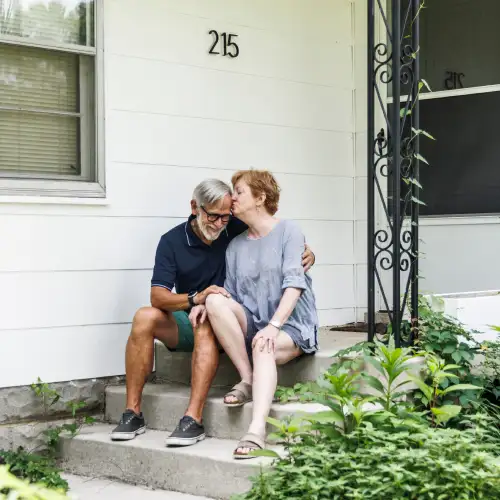Who is a first-time home buyer?
You don’t have to be brand new to real estate to qualify as a first-time home buyer. According to the Federal Housing Administration (FHA) and the IRS, you may be considered a first-time buyer if you haven’t owned a principal residence in the past three years. A principal residence is the home where you live most of the time—not a vacation or rental property.
You may also qualify if:
- You previously owned a mobile or manufactured home that wasn’t permanently attached to a foundation
- You inherited a home, but never lived in it as your primary residence
- You owned a property that didn’t meet local or state building codes and would have cost more to repair than rebuild
Thanks to these broader definitions, more people are eligible for first-time home buyer programs, grants and loans than you might expect.
What are the benefits of first-time buyer programs?
First-time home buyer programs are designed to make homeownership more accessible, especially if you’re working with a tight budget or limited credit history. These programs can help ease common roadblocks by offering:
- Low or no down payment: Some loans require as little as 3% down, or even nothing at all.
- Reduced closing costs: Grants or lender credits can offset fees like inspections, appraisals and title services.
- Flexible credit score requirements: Many programs are open to buyers with fair or limited credit histories.
- Homeownership education courses: You’ll get access to courses that walk you through budgeting, mortgage basics and long-term financial planning.
- State and federal tax credits: Depending on where you live, you may qualify for valuable tax breaks that lower your overall cost of buying.
The goal of these programs is to make homeownership feel possible—so you can focus on finding the right place to live, not just on how to pay for it.
How do I qualify for a first-time buyer program?
You don’t have to be a total newcomer to qualify as a first-time home buyer. In fact, many programs define a first-time buyer as someone who hasn’t owned a home in the past three years. So, even if you’ve owned property before, you may still be eligible if it’s been a while.
Other situations that may qualify you include owning a mobile or temporary property that wasn’t attached to a permanent foundation, or having owned a property that didn’t meet safety regulations and required repairs that exceeded its value.
While each program has its own requirements, two major factors typically come into play:
- Your debt-to-income ratio (DTI): Your DTI measures how much of your monthly income goes toward debt payments. A lower ratio signals to lenders that you’re more likely to manage mortgage payments consistently. While exact limits vary, many programs prefer a DTI of 43% or lower.
- Your credit score: Your credit score helps determine your eligibility and the loan terms you qualify for. Higher scores unlock better interest rates and more loan options, while lower scores may limit your choices or require extra documentation. Minimum score requirements vary by loan type (FHA, VA, USDA, etc.), so it’s a good idea to check what your score needs to be for the program you're targeting.
Other factors that can affect your eligibility are:
- Income limits: Many programs set income caps based on your area’s median income.
- Home purchase price caps: Some programs limit how much you can spend on your new home, ensuring that the assistance is directed to those who need it most.
- Location: Some programs are only available in specific counties, cities or ZIP codes. It’s important to check that the program you’re interested in applies to your location.
- Education courses: You may need to complete home buyer education classes.
Understanding how these criteria apply to your situation can help you narrow down the best first-time buyer options for your needs.
Types of first-time home buyer programs
Before diving into specific loan types, let’s look at the big picture. Most first-time buyer programs fall into four main categories. Here’s a quick overview:
Institutional lender programs
Banks and other private lenders offer mortgage programs specifically for first-time buyers with relaxed requirements and reduced costs. For example, Citi’s HomeRun® Mortgage offers a low down payment option that helps support buyers from a wide range of financial situations as they take their first steps up the property ladder. However, such programs may be available only in select markets or have other limitations, such as income or purchase price caps, so be sure to read the fine print.
Government-backed programs
When we say "government-backed" programs, we're talking about three main types:
- Government-insured: These loans are insured by a government agency to protect lenders if the borrower defaults. A common example is the Federal Housing Administration (FHA) loan, designed to help first-time buyers qualify for a low down payment.
- Government-sponsored entities: Fannie Mae and Freddie Mac help keep the mortgage market affordable and stable by buying loans from lenders and selling them as securities.
- Government-guaranteed entities: VA loans, for example, are guaranteed by the government, which ensures the lender is covered if the borrower fails to repay. VA loans are available to active-duty service members, veterans and their surviving spouses.
State & local programs
Many states and localities offer programs such as down payment assistance, competitive mortgage rates and tax credits tailored to make homeownership more accessible. Sometimes, you can even combine these offerings with federal programs to maximize your benefits.
Charitable, nonprofit & other programs
In addition to government and institutional offerings, there are also charitable and nonprofit programs that provide grants and assistance, often targeted at specific communities. These can be hidden gems for first-time buyers, especially if you’re part of a local initiative or employee program.
What loans are available for first-time home buyers?
Now that you’ve got the big picture, let’s dig deeper into the popular loans, programs and grants.
FHA Loans
FHA loans let you put down as little as 3.5% if your credit score is at least 580. Plus, they come with a unique perk: your mortgage is assumable. That means if you put your home back on the market, a buyer can take over your loan with the same interest rate, making it a great selling point. But keep in mind, FHA loans come with mandatory mortgage insurance premiums (MIP) that may weigh down your monthly payment. Lenders, like Citi, have stricter requirements for the minimum credit score. In addition, there are restrictions and requirements for a buyer to assume an FHA mortgage.
Conventional 97 Mortgage Loans
Fannie Mae and Freddie Mac have their own low-down-payment alternatives to FHA loans. As the name hints, a conventional 97 loan lets you put down 3% of your own funds and borrow 97% of the home’s value from a lender. To land 3% down, you must have a credit score of at least 620, pay for private mortgage insurance and take a homeownership education course.
VA Loans
VA loans are available to veterans, active-duty service members and eligible surviving spouses. You may qualify for competitive interest rates thanks to support from the U.S. Department of Veterans Affairs. You’ll need to meet VA eligibility guidelines, but for those who qualify, VA loans can be a cost-saving option.
USDA Loans
US Department of Agriculture loans are designed for buyers in eligible rural and suburban areas, offering no down payment options and lower mortgage insurance costs. Income and location limits apply, making them ideal for those looking outside major metro areas.
Citi HomeRun Mortgage
Citi’s HomeRun Mortgage is built for first-time buyers and those in underserved communities. Requiring as little as 3% down and no PMI, this mortgage option helps make homeownership more accessible. HomeRun also offers flexible credit guidelines and allows non-traditional income sources to support buyers who may not qualify for conventional loans.
HomeReady® and Home Possible® loans
These programs from Fannie Mae and Freddie Mac cater to low- to moderate-income buyers. Requiring just 3% down and offering the ability to use gift funds or grants, they’re especially helpful if you’re buying in a high-cost area or earning less than the area’s median income.
Are there first-time buyer grants by state?
Many states offer first-time home buyer grants and assistance programs that can help cover upfront costs like the down payment and closing fees. These programs are typically provided through each state’s Housing Finance Authority (HFA) and may be combined with federal or lender-backed loan options.
Down payment assistance (DPA)
Saving for a down payment is one of the biggest hurdles for new buyers. That’s why many states offer down payment assistance (DPA) through grants or forgivable loans. These programs can cover thousands of dollars toward your purchase—some with no repayment required if you stay in the home for a certain number of years.
Closing cost support
State and local programs may help with closing costs like inspections, title fees and escrow charges. Support may come in the form of grants, deferred-payment loans or matched savings programs. These can ease the financial burden of homebuying and help you move forward with less cash up front.
Explore state programs
Grant and assistance programs vary widely by location. Here are some popular state-level options to explore:
- California: CalHFA MyHome Assistance Program
- Florida: Florida Assist and HFA Preferred programs
- Texas: My First Texas Home and Texas Bootstrap Loan Program
- New York: HomeFirst Down Payment Assistance
- Illinois: IHDAccess Forgivable and SmartBuy programs
To get the most accurate info, visit your state’s Housing Finance Authority website. Also, be sure to check out our Cost of Living Calculator to possibly evaluate affordability in your state, or our Home Affordability Calculator to see how much home you can afford.
PRO TIP
Many first-time buyers combine a low-down-payment loan with state or employer assistance programs to maximize savings. You don’t have to choose just one program—look into all the options that might apply to you.
Charitable, nonprofit & other first-time home buyer programs
Plenty of charitable, nonprofit and third-party groups want to see homeownership thrive in their community. We’ll cover a few standout programs, but look into what’s available in your neck of the woods, from company benefits to local housing initiatives.
Habitat for Humanity
This nonprofit rolls up its sleeves and builds or revamps homes for those in need. They offer generous zero-interest loans to first-time home buyers who earn 60% or less than the local median income.
Neighborhood Assistance Corporation of America
This HUD-certified nonprofit helps first-time home buyers secure a low-rate mortgage without a down payment, closing costs or mortgage insurance. If you have lower credit, no worries—this program uses rent payment history and other factors to determine your eligibility.
Employer-sponsored first-time home buyer programs
Some employers also offer benefits to help you buy a home, including matching contributions or direct grants toward your down payment. Policies will vary, so you’ll have to read up on your company benefits. Also, be on the lookout for rules around income limits and time on the job.
Loans and grants for student borrowers
Many programs cater to students with limited savings and lots of debt. Some schools even offer grants, scholarships or fund-matching to cover upfront costs. For instance, Ohio offers a Grants for Grads program that provides up to 5% down payment support for recent students. Check with your housing department or financial aid office to find out what's possible with your alma mater.







